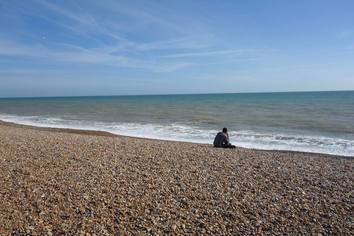ONLINE TRAUMA THERAPY
There are over 500 psychotherapies out there for your well-being and psyche.
Traditional talking psychotherapies have been shown to be not as effective in treating trauma, and trauma memories as newer forms of psychotherapy which are informed by neuroscience.
Experts now know a lot more about the brain than the 'great-grandfathers' of psychotherapy. This newer, and rich information about neuroscience/brain/body has allowed therapists to adapt therapies into much more helpful aids to recovery than in the past. Even CBT therapy, one of the more modern therapies, is now shown to be flawed in relation to trauma treatments.
There have even been unhelpful labels such as 'Treatment Resistant Depression, 'Borderline Personality Disorder' & 'Treatment Resistant PTSD' bandied around which have impacted negatively on a persons' recovery. I use a combination of 'brain/body therapies' & IFS therapy to help people who have been told that they have these diagnoses.
Sometimes talking 'over and over' about what happened seemingly in a normal way, is even unhelpful, and this can further embed the trauma. Sometimes it's like a wheel that's stuck in the mud, the more it spins in the same direction, and goes over the same ground, the deeper into the mud it goes. To become unstuck and free the effects of trauma something different is needed.
The trauma therapies that I use are under the umbrella term 'psychotherapy & neurotherapies' - these work with the neurological wiring of the brain and nervous system. The therapies work by helping the Brain, Body & Mind to work together as one to heal itself. As an experienced and thoroughly trained trauma therapist, I can use my clinical judgement to use a method to best help you in session to session. Your input is also taken into consideration, and we work together to help you recover.
I'm trained in the therapies below, they are highly regarded for the treatment of trauma, complex PTSD, and PTSD.
So which is best for you?
I don't know, without meeting and doing the work in each session, you. Most people I see benefit from a unique blend of the above therapies. I find I use Brainspotting online, somatic therapy and IFS online mostly. I'm trained and qualified in all the wonderful therapies above, though, so we can tailor each session so that it's best for you!
To find out more about trauma therapies watch the videos below, and take a visit to Counselling For Liverpool's PTSD & Trauma
page.
Traditional talking psychotherapies have been shown to be not as effective in treating trauma, and trauma memories as newer forms of psychotherapy which are informed by neuroscience.
Experts now know a lot more about the brain than the 'great-grandfathers' of psychotherapy. This newer, and rich information about neuroscience/brain/body has allowed therapists to adapt therapies into much more helpful aids to recovery than in the past. Even CBT therapy, one of the more modern therapies, is now shown to be flawed in relation to trauma treatments.
There have even been unhelpful labels such as 'Treatment Resistant Depression, 'Borderline Personality Disorder' & 'Treatment Resistant PTSD' bandied around which have impacted negatively on a persons' recovery. I use a combination of 'brain/body therapies' & IFS therapy to help people who have been told that they have these diagnoses.
Sometimes talking 'over and over' about what happened seemingly in a normal way, is even unhelpful, and this can further embed the trauma. Sometimes it's like a wheel that's stuck in the mud, the more it spins in the same direction, and goes over the same ground, the deeper into the mud it goes. To become unstuck and free the effects of trauma something different is needed.
The trauma therapies that I use are under the umbrella term 'psychotherapy & neurotherapies' - these work with the neurological wiring of the brain and nervous system. The therapies work by helping the Brain, Body & Mind to work together as one to heal itself. As an experienced and thoroughly trained trauma therapist, I can use my clinical judgement to use a method to best help you in session to session. Your input is also taken into consideration, and we work together to help you recover.
I'm trained in the therapies below, they are highly regarded for the treatment of trauma, complex PTSD, and PTSD.
- AEDP Lv1 Therapist- Accelerated Experiential Dynamic Psychotherapy - This is a form of psychotherapy developed by Dr Diana Fosher. Dr Fosher looked at what worked within psychotherapy and also built this form of psychotherapy is informed by neuroscience and attachment. Essentially, it is heavily focused on the relationship within a talk therapy, with somitic elements and inner child work. The theory is close to Person-Centred Therapy and IFS Therapy. It can be described as a 'turbo-charged' therapy
- BSP - Brainspotting (1,2,3, & Masterclass) - This approach was developed by Dr David Grand, one of the original therapists working with EMDR therapy in the 1980s. Dr Grand discovered that there were correlations between a person's 'eye positions' and physical or 'somatic' sensations. When a traumatic incident occurs, it leaves an imprint on your brain. Dr Grand called these trauma imprints - 'Brain spots'. Dr Grand used his expert knowledge in neuroscience & psychotherapy to develop a powerful therapy that can process and release these brain spots - Initially, he called it 'Free-Flow EMDR' as his method was born out of EMDR. Dr Grand developed his approach, which he called Brainspotting. He used his expert knowledge in neuroscience to develop the theory. Brainspotting is a therapy that is now used globally - it has caused a lot of excitement among therapists, as many therapists find it complements and integrates well with their original way of working. Brainspotting helps process trauma at a somatic and cognitive level without the need to talk about the trauma. Brainspotting can also work with many physical problems, that talking therapy alone would not be of benefit to. There are over 13,000 therapists that are using Brainspotting, and many more clients have benefited from this approach. Doing Brainspotting Online is one of the easiest ways to access the power of your Brain from your own home!
- EMDR - Eye Movement Desensitization & Reprocessing (Lv1,2,3)- This approach was developed by Dr Francine Shapiro and was the first of its kind. She stumbled upon the phenomenon in 1987 and then developed a therapy around it. She discovered that bilateral eye movements could help us feel differently. EMDR was well researched for the treatment of PTSD, clinical trials were conducted, and it quickly became the treatment of choice for Post Traumatic Stress Disorder. EMDR is more than eye movements alone. There are 8 phases to EMDR, so even though it is believed to be a quick therapy - it is sometimes no shorter than any other therapy. If someone came to me with a simple car crash trauma, I think that it could be processed pretty quickly using this approach.
- EMI - Eye Movement Integration (Lv1,2 & Supervision) - This approach was developed about the same time as EMDR in 1989 by Connirae and Steve Andreas. Dr Danie Beaulieu took this approach to therapy forwards. Although it is probably not as well known as EMDR, it is just as effective. EMI, like EMDR also makes use of eye movements, but EMI employs 24 different ones! The 24 different eye movements are said to connect more areas of the brain to help process trauma than EMDR. I have used this approach a lot and have found it to be more effective in the treatment of trauma for people that have tried EMDR in the past. It is best thought of as an EMDR hybrid. I have helped people get past traumas such as road traffic incidents in two sessions of EMI.
- IFS - Internal Family Systems (Lv1,2,3 & Masterclass) - This approach was developed by Dr Richard Schwartz in the 1980s. He theorized that we are all made up of 'Parts' just like a system or computer. Each part has its role, and all parts have our best intentions, to help us live. Sometimes 'parts' may conflict, or cause other parts distress. For example, we sometimes feel torn in two, three or many other ways. You may want to do one thing, and also want to do another... This would be two parts - two parts that hold different beliefs. Dr Richards Schwartz postulated that many Parts are protecting something... For example, you may have a part that binges on something as a way of protecting you from feeling upset or alone. In IFS therapy, the therapist will guide you to be your therapist to your Parts, which will give you a feeling of more of what Schwarz called Self Energy - a positive state of being - the phenomenon of not being consumed by anything - a feeling of confidence and peace. Doing IFS Online Therapy has proved to be a favourite way of working for many of my clients, as it can feel very comfortable to close your eyes and 'go inside' in the comfort of one's own space.
- Lifespan Integration Lv1 &2 - This is a fairly new approach in the trauma field. It tends to be quite gentle, but can be powerful too. Lifespan Integration is informed by neuroscience. It doesn't take too much work from the client and isn't a talking therapy. Lifespan Integration can aid healing and from the effects of traumatic experience. Lifespan Integration is used within the NHS's only specialist unit The Maudlsley Hospital, the NHS's only treatment hospital for complex post-traumatic stress disorder (PTSD) and severe dissociative disorders.
- Sensorimotor Psychotherapy (Lv1 Trauma Themes) - This approach was developed by Pat Ogden, SP Therapy is a body based/somatic based psychotherapy that utilizes the body as a vast resource for healing trauma and attachment injury. However, it is not just about the body, it is about the mind, and emotions too. It is a heavily mindful approach to therapy, and is a 'doing therapy' it is not just talking. It involves experiments and lots of input from the therapist. SP Therapy can help with unprocessed trauma trapped in the body, and also phenomena such as 'dissociation'.
So which is best for you?
I don't know, without meeting and doing the work in each session, you. Most people I see benefit from a unique blend of the above therapies. I find I use Brainspotting online, somatic therapy and IFS online mostly. I'm trained and qualified in all the wonderful therapies above, though, so we can tailor each session so that it's best for you!
To find out more about trauma therapies watch the videos below, and take a visit to Counselling For Liverpool's PTSD & Trauma
page.
Sometimes it may make more sense to seek psychotherapy online outside your country due to times, language travel and finances.
Chris provides online psychotherapy to many countries including: UK, USA, Dominican Republic, Belgium, Germany, Portugal, Spain, New Zealand, Australia, Israel, Iceland, Norway, Japan, and Sweden. All sessions are in English language.
Chris provides online psychotherapy to many countries including: UK, USA, Dominican Republic, Belgium, Germany, Portugal, Spain, New Zealand, Australia, Israel, Iceland, Norway, Japan, and Sweden. All sessions are in English language.






